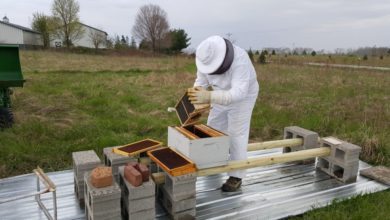Childhood cancer leaves lifelong effects
September 2018 is nearly in the books. And as time passes, September 2018 will be a distant memory if not forgotten by many.
As the calendar rolls around to September each year, it is also time to pause to remember how childhood cancer can impact and devastate a family’s life.
According to Cure Search, approximately 15,300 parents will learn that their child has cancer each year. Of those, nearly 12-percent do not survive, and 60-percent of those who do survive suffer late-effects such as infertility, heart failure or secondary cancer later on in life.
Mahomet resident Staci Chappell knows the story all too well.
Nearly eight years ago, Chappell’s daughter, now nine-years-old, spent every day worried about her daughter who was puking regularly.
“They kept telling me it was acid reflux,” Chappell said.
At three or four months old, Chappell said, “you can explain it away because it’s not going to happen to you.”
Then when her daughter was 11-months old, and experiencing extreme pain when being held upright, an eye that turned in and a seizure, Chappell just wasn’t going to wait around anymore.
“It was mother’s instinct,” she said. “I knew something more was wrong.”
A visit to the pediatrician ended with a CAT scan in the ER that showed her daughter had a brain tumor.
“All hell broke loose,” she remembers. “Within a couple of hours, they coordinated a flight at 2 a.m. to Memphis. I left my son and husband. And we went to St. Jude.”
A few days later, on December 8, her daughter was in surgery. Then she began chemotherapy and radiation treatments that lasted until she could come home in June.
“I’m friends with the nurses, and they tell me they didn’t think she was going to live.”
Chappell said she lives daily with the regret of following her instincts and taking her daughter for the scan earlier.
“Hindsight is 20/20,” she said. “I knew it wasn’t acid reflux, but I let them put her on medicine because the doctor said so.
“I knew something was wrong. I didn’t think it was cancer, but I knew something was wrong.
Chemotherapy and radiation treatments also caused mouth sores, which traveled down her throat, rotted teeth, caused other infections and her daughter still goes for annual examinations because she is at a greater risk for developing cancer again.
Chappell’s daughter now lives with the long-term effects of the brain tumor and cancer treatments. Severely disabled, she is wheelchair-bound.
“I had a son, then I had a girl and I thought that we were going to be that picture perfect family,” she said. “She’s going to go to cheer practice. If I had known when she went into surgery that I would never see her again, I think I would have taken longer.
“She’s still there, but she’s not her.”
Chappell said her daughter had said her first word before she was diagnosed, and now her daughter is still working on speaking that first word again.
“Don’t get me wrong, she’s happy. She still does new things. She does new things all the time, and I’m just in awe. But again, this wasn’t going to happen to me, this isn’t what I planned.”
Chappell’s message is to encourage parents to be that advocate for their child.
“I learned through that whole thing that I was her voice. She could not communicate; I was the only one that could say this is normal, this isn’t normal.”
The lifelong effect of cancer on the Chappell family takes a toll. Staci also wants to remind community members to be there for other families if a child is diagnosed with cancer.
“Be aware of how to treat people when they are going through it,” she said.
Aside from financial support, Chappel said, “just ask them what they need. Do you want a book, lunch, just want to yell cuss words in my ear?”
“Be sincere about it.”

